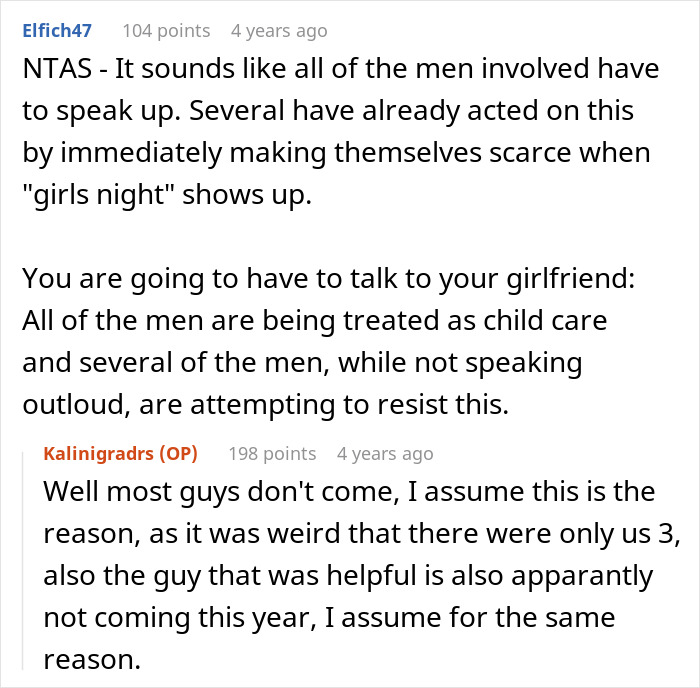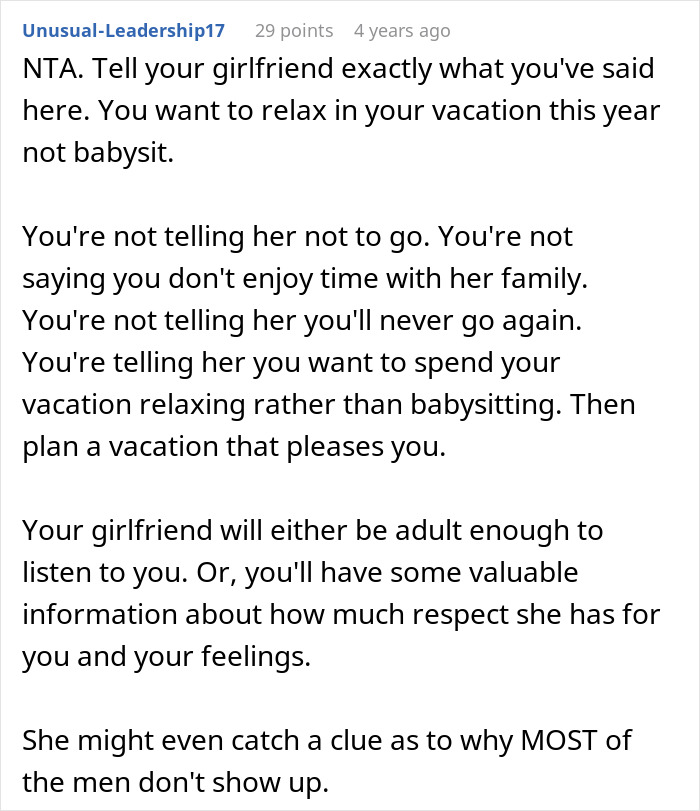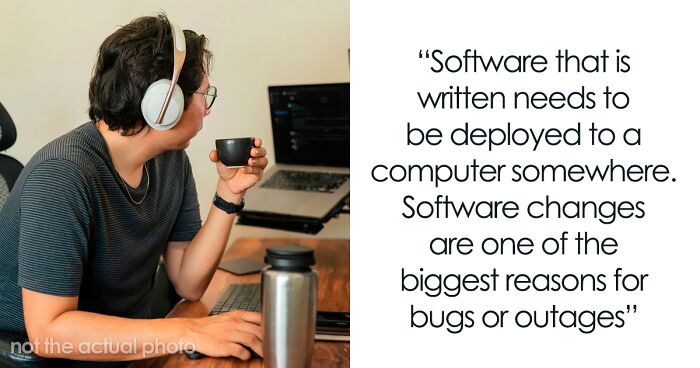
Guy Learns From Last Trip With GF’s Family, Refuses To Go Ever Again: “Not My Idea Of Vacation”
Getting along with your partner’s family is usually a great thing. But sometimes, it can be a little too much.
This Redditor was invited to join his girlfriend’s family on their annual getaway for the second time. And while it might sound like a dream vacation, last year he ended up spending nearly half the trip babysitting all the kids. Not exactly his idea of a relaxing break.
So now he’s thinking of sitting this one out. But with everyone excited to see him again, he’s asking: would skipping it make him the bad guy?
The man was invited to join his girlfriend’s family on their yearly vacation
Image credits: Ruslan Zaplatin / unsplash (not the actual photo)
But as fun as it sounds, he’s not so sure he wants to go
Image credits: tabitha turner / unsplash (not the actual photo)
Image credits: Kalinigradrs
Why is it so hard to set boundaries?
Image credits: Ihnatsi Yfull / unsplash (not the actual photo)
In this story, it’s tough to say what the “morally right” choice is. Should OP go on the family trip even if it means being stuck watching the kids again, or should he decline and risk looking rude? Either way, it’s easy to see why he’s feeling hesitant.
Saying no is one of the hardest things to do.
That’s because, let’s face it, uncomfortable conversations aren’t fun. Many of us would rather deal with something we don’t want to do than speak up and say we don’t want to do it in the first place.
In fact, one study found that 48% of Americans would describe themselves as people-pleasers. That number jumps to 52% for women, compared to 44% for men. So yeah, saying yes when we really want to say no? Not exactly rare.
But why does saying no feel so confrontational or even wrong?
Kristen Lee, Ed.D., LICSW, behavioral science professor, psychotherapist, and comedian, explains why we often struggle to set boundaries.
FOMO (Fear of Missing Out)
This comes into play when we’re scared to miss out on growth, fun, recognition, or anything that gives us that feel-good boost. We end up saying yes to everything, even when we’d rather be anywhere else.
On a healthy day, FOMO might push us to engage in new and exciting experiences. But when it takes over, it leads to chaos and we lose track of what we actually want to do.
Perfectionism
You’d rather carry the stress than let someone down. You want to give your best to everything and everyone, and saying no might feel like failure or weakness.
Instead, you say yes, hoping to please others, prove yourself, or make up for something.
Social conditioning
Our identities often get tied up in how much we do for others.
“This is especially true for women, who have long been in positions where ‘emotional labor,’ the work of nurturing and tending to people’s emotions, is expected and demanded of us,” says Lee.
So when you feel pressured to overperform, especially in family or social settings, it becomes harder to say no. But keep doing that, and burnout is pretty much inevitable.
If that all sounds familiar, here’s what Lee recommends to help you develop healthier habits around boundaries:
- Define what matters most to you
- What are your core values?
- How are they showing up in your day-to-day life?
- Look at the big picture
“Living your life like a Superhero wanna-be can exhaust even the most earnest, noble-hearted of humans. Let your no be someone else’s yes. Say no to less important things and yes to ones that matter most,” says Lee.
- Buy yourself time
- When someone asks something of you, it’s okay to pause and reflect. Lee suggests asking yourself:
- Is this the right fit for me right now?
- Is it urgent, or will this come up again?
- If the roles were reversed, would this person help me?
- Practice saying no
You don’t have to be harsh, just prepared. Jot down a few phrases that feel natural. For example:
- “That sounds like a great opportunity and I want to help. Is it OK if I give it some time to think about it?”
- “I’d love to, but I know I’m overcommitted and won’t be able to give this the time it deserves.”
- “Can you approach me again on this in a few weeks?”
- “It’s really hard for me to say no, but I have to this time.”
“The secret to setting boundaries is giving yourself permission to live true to your values, not everyone else’s demands and agendas. You can’t say yes to everyone and everything and still stay healthy,” says Lee.
He later admitted he’s worried that saying how he feels will come off as ungrateful
[NTA]
Some readers said he wasn’t wrong, but felt he should just talk it out
Others, however, thought he was being unreasonable
Poll Question
Thanks! Check out the results:
For 3 out of 7 days, I'd do it and I not even her bf
Load More Replies...Not to be a d**k, but does anyone read the text BP added? Or just the reddit screenshots?
He said it was him with the male children. Is it a coincidence that all the kids are male, or were the female children allowed to be at the girls nights? At first I thought the ladies just wanted child-free nights and were definitely being selfish as they could have taken it in turns selecting who watched the kids out of all the adults. But if they genuinely did half the holiday segregated on gender lines then that is weird as well as selfish. What lesson are the little boys learning about the women in their family? What choice do any of the children get if they're either interested or not interested in 'gender specific' activities.
For 3 out of 7 days, I'd do it and I not even her bf
Load More Replies...Not to be a d**k, but does anyone read the text BP added? Or just the reddit screenshots?
He said it was him with the male children. Is it a coincidence that all the kids are male, or were the female children allowed to be at the girls nights? At first I thought the ladies just wanted child-free nights and were definitely being selfish as they could have taken it in turns selecting who watched the kids out of all the adults. But if they genuinely did half the holiday segregated on gender lines then that is weird as well as selfish. What lesson are the little boys learning about the women in their family? What choice do any of the children get if they're either interested or not interested in 'gender specific' activities.

 Dark Mode
Dark Mode 

 No fees, cancel anytime
No fees, cancel anytime 














































































44
31